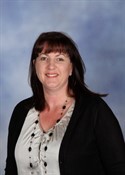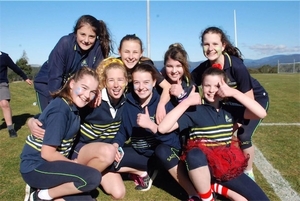January 2020
Newsletter Articles
- WELCOME
- OUR COLLEGE
- CONTACTS
- TERM DATES
- MAPS
- COLLEGE SCHEDULE
- PASTORAL CARE
- COLLEGE COUNSELLOR
- SCHOOL ATTENDANCE
- COMMUNICATION
- PARENT CONCERNS
- CURRICULUM: LEARNING AND TEACHING
- ASSESSMENT AND REPORTING
- PARENT-TEACHER CONFERENCES
- HOMEWORK
- STUDENT LEADERS
- UNIFORM
- GRADE TEN TRANSITION
- INDIGENOUS PROGRAM
- TRANSPORT AND CAR PARKING
- OUTSIDE SCHOOL HOURS CARE
- HEALTH AND SAFETY
- TECHNOLOGY AT THE COLLEGE
- CHAPEL AND MASSES
- LIBRARY
- BOOK CLUB
- FRENCH
- MUSIC
- CANTEEN
- HEALTH AND PHYSICAL EDUCATION
- AFFILIATED ASSOCIATIONS
- Birth to Four ‘Explorers’
- COLLEGE CONTRIBUTIONS
- VOLUNTEERING AND WWVP
- TERMS, CONDITIONS AND FEES
- FEEDBACK
WELCOME

Mr Joe Sandric, Acting Principal
Welcome to the St Aloysius Catholic College Handbook. The purpose of the Handbook is to provide parents, caregivers, guardians and students a ‘go to guide’ about the day-to-day operations and procedures for the College. We hope that you find the Handbook useful and we welcome any feedback or suggestions.
OUR COLLEGE
Executive
|
Mrs Susan
McGann, |
Ms Susanna
Bond, |
|
Mrs Donna
Duggan, |
Mrs Samantha
Wilton, |
|
Mr Les Gardner, |
Mrs Rachael
Adams, |
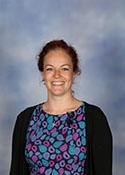
Mrs Polly Marriott,
Head of Mission
Religious Education Leaders
|
Mrs Cristy
Mahoney, |
Mr James
Wright, |
Pastoral Care Co-Ordinators
Kinder – Grade 4

Mr Matthew Gardiner
Grade 5 /6

Mrs Angela Sullivan
Grade 7

Mr Martin McManus
Grade 8

Mr James Wright
Grade 9

Mr Peter Kay
Grade 10

Mrs Natasha Harris
Staff
CONTACTS
Kingston Campus
123 Roslyn Ave
Kingston Beach TAS 7050
P: 03 6229 0200
E: sacc@catholic.tas.edu.au
Office Hours: 8.15am – 3.15pm
Huntingfield Campus
12 Nautilus Grove
Huntingfield TAS 7055
P: 03 6229 0100
E: sacc@catholic.tas.edu.au
Office Hours: 8.15am – 3.30pm
Parish Contacts
Parish Office of Christ the
Priest
P: 6229 1280
Parish Priest: Father Chris Hope
Parish Secretary: Anne
Cooper
P: 6229 1280
TERM DATES
Term dates for 2020 are as follows:
|
START |
FINISH |
|
|
Term 1 |
Thursday 6 February |
Thursday 9 April |
|
Term 2 |
Monday 27 April |
Friday 3 July |
|
Term 3 |
Monday 20 July |
Friday 25 September |
|
Term 4 |
Monday 12 October |
Thursday 17 December |
Easter 2020
- Good Friday: Friday 10 April
- Easter Monday: Monday 13 April
- Easter Tuesday: Tuesday 14 April
Public Holidays 2020
- Hobart Regatta Day: Monday 10 Feb
- Eight Hours Day: Monday 9 March
- Queens Birthday: Monday 8 June
- Hobart Show: Thursday 22 October
MAPS
Kingston Campus

Huntingfield Campus

COLLEGE SCHEDULE
Daily Structure
|
Kingston Campus |
Huntingfield Campus |
|||
|
Start |
Finish |
Start |
Finish |
|
|
Classrooms Open |
8.25am |
8.40am |
8.30am |
8.40am |
|
Meditation / Homeroom |
8.40am |
8.45am |
8.40am |
8.50am |
|
Period 1 |
8.50am |
9.40am |
||
|
Period 2 |
9.40am |
10.30am |
||
|
RECESS |
10.40am (10mins eating time) |
11.20am |
10.30am |
11.00am |
|
Period 3 |
11.00am |
11.50am |
||
|
Period 4 |
11.50am |
12.40pm |
||
|
LUNCH |
12.55pm (10mins eating time) |
1.35pm |
12.40pm |
1.25pm |
|
Period 5 |
1.25pm |
2.15pm |
||
|
Period 6 |
2.15pm |
3.05pm |
||
|
Homeroom |
3.05pm |
3.10pm |
||
|
School Finishes |
2.55pm |
3.10pm |
||
* Kindergarten finishes at 2.40pm
PASTORAL CARE
Houses

The College has four houses that students belong to and when participating in school carnivals or events they can earn points for their house. Siblings are placed into the same house. The four houses are:
Aikenhead – Green
This house is named after Mary Aikenhead, the founder of the Sisters of Charity. The Sisters of Charity founded St Aloysius in 1960.
Aloysius – Yellow
This house is named after St Aloysius Gonzaga, whom which our College is named after.
Charity – Red
This house is named after the Sisters of Charity, the religious order who founded the College.
Fides – Blue.
Fides is Latin for faith. Fides was the original motto of the College.

Kingston Campus
At the Kingston Campus we believe that it is important that all students have the right to feel safe and valued as a member of the College community. The Campus has adopted a School Wide Positive Behaviour Support (SWPBS), which is a whole-school approach to creating a safe and supportive environment that has a strong evidence-base and is used in many schools throughout Australia.
Our approach focuses on everyone and all settings within the campus and promotes a positive focus on academic and behavioural outcomes across the College. It clearly defines our core expected behaviours (4 Bs), which are:
- Be a Learner
- Be Safe
- Be Fair
- Be Respectful
Expected behaviours are acknowledged and rewarded at both an individual (Betta Bee Cards, see POSITIVE BEHAVIOUR SUPPORT SYSTEMS for further Betta Bee information) and class level (Campus Dojo points). Class groups can earn “Dojo Monsters” for positive behaviour in line-ups, specialist lessons, relief days, church visits and moving respectfully around the campus. These culminate in a special offsite excursion or event for the top three classes at the end of each term.
Positive Behaviour Support Systems
Kingston
At St Aloysius Catholic College - Kingston Campus we actively teach and reinforce desired behaviour. We have four main expectations of behaviour:

- Be a Learner
- Be Safe
- Be Fair
- Be Respectful
The 4 Bs are consistently reinforced throughout the Campus and we have a very special mascot – Betta Bee who assists with reinforcing these expectations. During the first weeks of school each class will be working with their teachers to develop an understanding of what the 4 Bs look like in different ways in our College. Five years ago we introduced Betta Bee cards as part of our positive behaviour support program. This has been a very successful initiative. Class teachers and specialist staff will be handing out Betta Bee cards to students exhibiting desired 4 Bs behaviour. The table below clearly explains to staff, students and parents the current reward system at the Kingston Campus. Students carry their Betta Bee tallies from one year to the next.
What happens if I make a good choice?
|
BETTA BEE CARD |
REWARD |
|
Five Cards |
Certificate |
|
Ten Cards (Fifteen Total) |
Certificate |
|
Fifteen Cards (Thirty Total) |
Bronze Badge |
|
Five Cards (Thirty-Five Total) |
Certificate |
|
Ten Cards (Forty-Five Total) |
Certificate |
|
Fifteen Cards (Sixty Total) |
Silver Badge |
|
Five Cards (Sixty-Five Total) |
Certificate |
|
Ten Cards (Seventy-Five Total) |
Certificate |
|
Fifteen Cards (Ninety Total) |
Gold Badge |
|
Fifty Cards (One Hundred and Forty Total) |
The Betta Bee Wall of
Fame |
|
Fifty Cards (One Hundred and Ninety Total) |
The Beta Bee Menu Of
Champions |
|
Fifty Cards (Two Hundred and Forty Total) |
The Betta Bee Menu Of
Champions |
|
Fifty Cards (Two Hundred and Ninety Total) |
The Betta Bee Menu Of Champions Third Course |
Huntingfield Campus
At the Huntingfield Campus we believe that it is important that all students have the right to feel safe and valued as a member of the College community. The campus has implemented both a School Wide Positive Behaviour Support (SWPBS) and Social and Emotional Learning (SEL) program that aims to create a safe, respectful and fair environment in which the best learning can take place.
The Huntingfield Pastoral Care model operates under a tiered approach that aims to see all students live the College motto of Strive, Believe and Achieve. Our tier one is a comprehensive and evolving list of proactive events that aim to involve, empower and enrich student development. Some of the events include Bugs and Bees, Learning Centre gatherings, student led assemblies, Mental Health Week, communal Facebook postings, student leadership and regular social and emotional context in the College Newsletter.
Positive behaviour is rewarded both as an individual and through their house. House points are awarded for achieving across all our beatitudes of:
- BE Safe
- BE Respectful
- BE a Learner
This tally of house points goes towards an initial canteen voucher every Monday at Bugs and Bees and collectively contributes towards the overall house score. This will result in every member of that house going on an excursion to the beach, a Gold Class movie experience, Woody’s Roller World and other chosen venues.
Specific examples of inspirational behaviour and initiative taking are acknowledged through our Exceeding Expectation awards. These gold passes accumulate in their life at the campus and have a series of rewards.
The tier 2 strategies occur when a student needs additional support for behaviour, physical/mental health, bereavement or other external issues. Parents and teachers identify students requiring additional support and the time length will vary depending on the circumstances.
Tier 3 for students is a significant step that can involve the Huntingfield Pastoral Care team, our College Psychologist and if appropriate, support from the Tasmanian Catholic Education Office (TCEO). The student will have a detailed management plan ongoing to continue this support.
Positive Behaviour Support Systems
Each student can earn house points for demonstrating Be Attitudes. The house points can be allocated during special events, school hours or during out of school time events. Points are then counted by Grade Six Sports Leaders each week and added to the running tally for each Term. At the end of each term the house with the most points is rewarded with an exciting excursion or event.
BE Attitude Expectations Rubric
|
Location |
Safe |
Learner |
Fair |
Respectful |
|
In the Classroom |
|
|
|
|
|
On the Oval |
|
|
|
|
|
In Sacred Spaces |
|
|
|
|
|
Around the Toilets |
|
|
|
|
|
Around the Playground |
|
|
|
|
|
Using ICT Hardware |
|
|
|
|
|
Using ICT Software |
|
|
|
|
|
In Hallways, Corridors, Studio |
|
|
|
|
|
When we meet together |
|
|
|
|
|
On the Buses |
|
|
|
|
|
Canteen, Café |
|
|
|
|
|
Moving around the College |
|
|
|
|
|
Location |
Safe |
Learner |
Fair |
Respectful |
|
In the Classroom |
Sharing. Walking. Personal space. |
Focus on your learning. Listen. Ask great questions. Use your initiative. |
Share equipment. Let other people talk. Don’t distract others. Include others. |
Listen to others. Put your hand up instead of calling out. Use positive language. |
|
On the Oval |
Hands off. Personal space. Play with your age group. |
Listen to others and learn from them. Learn new sports. |
Let others have a turn. Be sportsman like. Make teams even. Include other people. |
Be polite. Encourage. Put your rubbish in the bin. |
|
In Sacred Spaces |
Walk when inside. |
Reflect. Try to understand. Listen. |
Let others pray. Be patient. Be quiet. |
Enter quietly. Be positive. |
|
Around the Toilets |
Clean up after yourself. |
Aim properly. Wash your hands properly. |
Be patient. Don’t push in line. Leave the cubical the way you found it. |
Respect the space. Only use what you need. Use the facilities properly. |
|
Around the Playground |
Beware of others. Hands to yourself. |
Work as a team. Try new things. Follow the rules. |
Include others. Share equipment. |
Use equipment appropriately. Include everyone. |
|
Using ICT Hardware |
Keep water and food away from the hardware. Be careful around hardware. |
Learn how the hardware operates. Use your time well. |
Look after the hardware. Put laptops on charge when finished. Share. |
Treat with care. Put on charge when you’re done. |
|
Using ICT Software |
Look up only what you need. Use appropriate websites. |
Use to the best of your ability to learn. Use responsibly. |
Use educational sites only. Leave others work done. Only use the internet for what you’re meant to. |
Keep on task. Leave others work alone. |
|
In Hallways, Corridors, Studio |
Keep your hands to yourself. Walk. |
Learn the appropriate behaviors. Read the BEattitude posters. |
Be polite. Share the space. Let others through. Let other classes work, be quiet. |
Be polite. Be aware of others |
|
When we meet together |
Keep your hands to yourself. Use equipment properly. |
Contribute ideas. |
Wait your turn to talk. |
Listen to whoever is talking. Sit and stand quietly. Applaud everyone. |
|
On the Buses |
Stay in your seats. Walk to your bus. Stay behind the yellow lines when waiting for the bus. |
Listen to the bus driver. Pay attention to what is around you. Obey bus rules. |
Let other people sit next to you. Don’t push when getting on. |
Listen to driver. Get on with everyone. |
|
Canteen, Café |
Pass food properly. Clean up afterwards. |
Understand how much change you should receive and spend wisely. Learn what is healthy. |
Be patient in line. Clean up after yourself. |
Wait inline politely. Share the seats. Use manners. |
|
Moving around the College |
Keep your hands to yourself. Stay on the path. Stay within the boundaries. |
Get involved in new things. |
Be polite to everyone. Let others go first. |
Put and rubbish you may have in the bin. |
What happens if I make a bad choice?
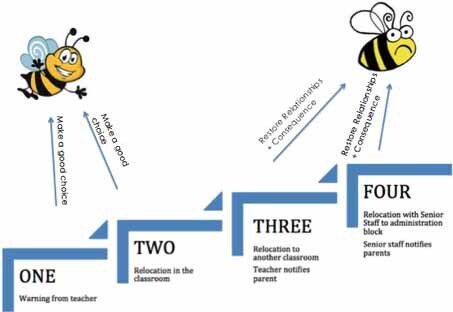
COLLEGE COUNSELLOR
St Aloysius is committed to the pastoral care and wellbeing of all students. Our College Counsellor, Ms Joanna Orchard, forms an important part of the College’s Pastoral Care Team. Joanna is a qualified social worker, providing confidential counselling, practical & emotional support and evidence-based intervention to students and families. She has extensive experience working across schools in southern Tasmania and is passionate about supporting and encouraging young people to reach their full potential.
Support to students is typically provided through:
- individual or group counselling
- skills-based group programs
- consultancy and advice to teachers and parents on a broad range of issues relating to young people
- onward referral to external agencies in cases where further, more comprehensive, support is required
Joanna works across both campuses of St Aloysius:
|
Huntingfield |
Monday, Tuesday, Wednesday & Friday |
|
Kingston |
Thursday |
Referrals to the counsellor…
For Family Members:
- Phone the relevant campus and ask to speak to Joanna or arrange a time for her to phone you.
- Email Joanna directly on Joanna.orchard@catholic.tas.edu.au.
- Come in to the office and ask whether Joanna is free or, if not, leave a message or organise a time for you to drop back in.
For Students:
- See your Pastoral Coordinator or Homeroom Teacher to make an appointment for you.
- Email Joanna directly on Joanna.orchard@catholic.tas.edu.au.
- Come in to the office and ask whether Joanna is free or, if not, leave a message or organise a time for you to drop back in.
SCHOOL ATTENDANCE
Absence
When a student is going to be absent from school, the College must be notified. This is a legal requirement in Tasmania, as all children between the ages of 5-17 must attend school on a full-time basis. It is also the College’s responsibility to keep an accurate record of student attendance. The College can be advised through the following ways:
- Phoning the College office
- Emailing the College via sacc@catholic.tas.edu.au
- Emailing the teacher (Homeroom teacher at Huntingfield)
- Using the Absentee Form on School Stream
Should a child be absent from school without prior advice from the parent or guardian, the College will send out an SMS advising that the student has been recorded as absent and a request that the College be contacted. In the event of continual un-notified absence, the College Deputy Principals or Principal will make contact with the parent or guardian.
Late for School
Arrival at school after the specified start time constitutes a late arrival, regardless of the reason. It is therefore important that the student is ‘signed in’ at the respective campus. There is a ‘sign in/out’ book located at the College office at both campuses. If a student is not signed in, they may be incorrectly marked absent for the whole day. A parent or guardian should accompany a K-Four student to the office to sign in, while it is acceptable for Grades Five-Ten students to sign themselves in.
Leaving during school hours
Where possible, it is preferred that an appointment for the student is made outside of school hours. However, we acknowledge that this isn’t always an option. At both campuses, a student who is leaving the school needs to be signed out by the parent or guardian via the ‘sign in/out’ book at the school office. Should the student return to the school after the appointment, they should be signed in via the ‘sign in/out’ book at the school office. At the Kingston Campus, a release form will be completed by office staff for the parent to give to their child's teacher, when they collect their child during school hours for an appointment.
Illness at the College
There are designated First Aid officers located at both campuses. These staff are trained in First Aid and can offer initial assessments and assistance. Should a student become sick or injured at school, they should seek permission from a teacher to go to the College office to receive First Aid. If it is deemed necessary for the student to go home, office staff will phone parents/guardians or the Emergency contact as listed in the student file.
Please note, First Aid officers are not able to administer medication (including over the counter medicines) or apply topical ointments unless prior written permission has been given (refer to Medication).
Medication
Should your child require medication during school hours, a Medication Authority Form must be completed by the parent / guardian and provided to the Campus office. All Medication should be named and it will be kept in a locked file at the school office. Children are not permitted to self-administer medication.
Extended Illness
In the event that your child is going to be absent from school for longer than two days, a medical certificate will be required. It is also requested that contact is made with the child’s class or Homeroom teacher in order to make arrangements for catching up on any missed work if needed.
Please refer to the attached document for the College Attendance Policy
COMMUNICATION
Newsletter
The College produces a newsletter each fortnight. This is issued via the School Stream app and can be accessed via the College website or you can sign up to receive email notifications when it is available, also via the website. The newsletter contains information and photos about activities occurring at the College, including Sport, Arts, Parish and Community links, upcoming events and community notices. There are printed copies of the newsletter available at each campus office.
http://sacckingston.schoolzineplus.com/newsletter/archive
Website
Refer to the school website for College information, policies, staff listings, positions vacant and school notices.
https://www.staloysius.tas.edu.au/
School Stream
The College utilises the School Stream mobile app for instant alerts, news, notes, reminders, newsletters and more. It is a pivotal source of up to date communication between the school and parents. The app can also be used to advise of a student absence via the Absentee Form. It is available for both Apple and Android phones from either the App Store or Google Play.
Having Problems? Click below for School Stream troubleshooting.
https://www.schoolstream.com.au/download/
Seesaw (Kingston)

An Educational Communication Tool
Seesaw is used at St Aloysius Catholic College as an Electronic Learning Journal (ELJ) for students from Kinder to Grade Four. It is a wonderful way for you as parents and carers to keep in touch with what your child is learning throughout the school year.
Seesaw provides your child with a safe space to document their learning as well as providing opportunities for them to learn how to use technology in a responsible manner.
Every child is provided with a personal ELJ and may add work, which they are doing at school, to share with you at home. When your child adds items, Seesaw automatically notifies you. Your child's journal is safe and secure as it is only accessible by your child, you and the class teacher.
Your child’s ELJ is accessible anytime via an iOS app, Android app or on the Web. Seesaw logins are available from your child’s classroom teacher.
Further information on Seesaw can be provided to you by the St Aloysius Seesaw Team. Please contact tamara.telley@catholic.tas.edu.au if you have any questions.
Fides (Huntingfield)

Fides is Huntingfield’s online learning management system and student intranet. Fides is cloud based, secure and aims to support student and parent communication, learning and teaching at St Aloysius. Teachers and students use Fides for:
- Daily news
- Student Calendars
- Student class pages
- Major assessments
- Feedback and grades
- Co Curricular group pages
- Sport and team rosters
In keeping with the College’s aim to maintain a close school – home communication, parents are provided with access to Fides and can follow their student’s learning, progress and engagement in College life. Please contact sacc.ictadmin@catholic.tas.edu.au if you have any questions or if you are having problems with logins or passwords.
PARENT CONCERNS
If a concern or query arises in relation to your child and their wellbeing or education, please refer to the following tables as to whom it is best to make contact with.
|
Parent Concern |
Kingston Campus |
Huntingfield Campus |
|
Student Management |
Class Teacher
Head of Pastoral Care
Deputy Principal |
Subject Teacher
Pastoral Coordinator
Deputy Principal |
|
Student Learning |
Class Teacher
Deputy Principal |
Subject Teacher
Deputy Principal |
|
Transport |
College Office
Deputy Principal |
College Office
Deputy Principal |
|
Extra-Curricular & Sport |
Mrs Nicole White |
Mr James Hickey |
|
Use of Technology |
Access Issues
Student Concerns |
Access Issues
Student Concerns |
|
All Serious Concerns |
Deputy Principal
Principal |
Deputy Principal
Principal |
|
Pastoral Coordinators |
||
|
Kinder – Grade 4 |
Mr Matt Gardiner |
|
|
Grades Five and Six |
Mrs Angela Sullivan |
|
|
Grade Seven |
Mr Martin McManus |
|
|
Grade Eight |
Mr James Wright |
|
|
Grade Nine |
Mr Peter Kay |
|
|
Grade Ten |
Mrs Natasha Harris |
|
Staff Contacts
|
Kingston Campus |
Huntingfield Campus |
|
|
Head of Pastoral Care |
||
|
Head of Teaching & Learning |
||
|
Daily Organiser |
||
|
Extra Curricular & Sport |
||
|
Use of Technology |
|
Kingston Campus |
Huntingfield Campus |
|
|
Head of Pastoral Care |
matt.gardiner@ |
susanna.bond@ |
|
Head of Teaching & Learning |
susan.mcgann@ |
donna.duggan@ |
|
Daily Organiser |
susan.mcgann@ |
belinda.molan@ |
|
Extra Curricular & Sport |
nicole.white@ |
james.hickey@ |
|
Use of Technology |
sacc.ictadmin@ |
sacc.ictadmin@ |
CURRICULUM: LEARNING AND TEACHING
Catholic values are central to learning and teaching at St Aloysius Catholic College. Within these values, we aim to foster self-esteem, self-confidence and respect for the gifts and needs of the individual and an awareness of the unique contribution each can make to the College community. We aim to provide a high quality, balanced education in which all students can fulfil their spiritual and academic potential.
Learning and teaching programs throughout the College are based on the Australian Curriculum, which has been designed to provide students with sound capabilities in literacy, numeracy, critical and creative thinking, information and communication technology, personal and social development and ethical and intercultural understanding.
All students also participate in a Religious Education program based on the Archdiocesan Good News for Living Framework.
St Aloysius Catholic College has a unique structure in that Kindergarten to Grade Four is situated at the Kingston Campus whilst the Huntingfield Campus has a Middle School from Grade Five to Eight and a Senior School for Grades Nine and Ten.
Kingston Campus

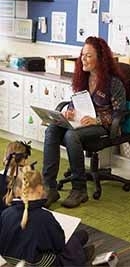
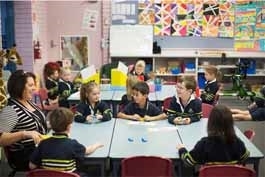
St Aloysius Catholic College-Kingston Campus specifically caters for students from Kindergarten to Grade Four in a nurturing learning environment appropriate for younger students in their first years of schooling. At the Kingston Campus we provide a gradual age appropriate development in curriculum throughout the Kindergarten to Grade Four years in order to ensure a seamless transition to the Huntingfield Campus.
At the Kingston Campus students engage in a comprehensive curriculum that takes into account children’s academic, social, physical and spiritual needs.
Students’ daily learning has dedicated Religious Education, numeracy and literacy time blocks with regular Humanities (History, Geography, Civics and Citizenship) and Science programmed into each week.
At Kingston weekly lessons are also offered in Music, Library, Physical Education, French (Grades Three and Four) and Social and Emotional Learning (Grades Prep, One and Two). Kindergarten students have experiences in Physical Education, Music and Library. Extra curricular activities are offered in dance, Choir, instrumental music, sporting events, STEM (Science, Technology, Engineering and Mathematics) and sporting teams.

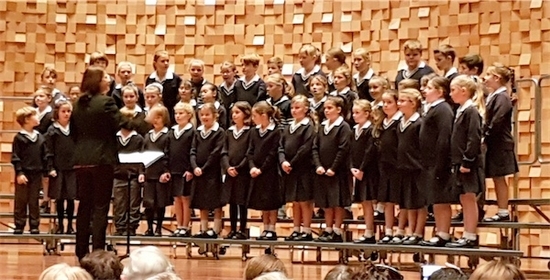
Huntingfield Campus
To assist students as they move into secondary education, St Aloysius Catholic College has implemented Middle Schooling principles for students from Grade Five to Eight. A Middle School curriculum is delivered in a manner that engages today’s students, including the integration of modern technology in learning. However, the literacy and numeracy needs of Grade Five to Eight students are still central and are explicitly taught. Middle Schooling at St Aloysius is about balancing age appropriate teaching and learning with opportunities for students to grow in their independence and maturity as learners.
Grade Five & Six
To ensure a smooth transition from Grade Four, the Grade Five/Six learning centre follows many of the learning structures from the Kingston campus. This includes dedicated daily literacy, numeracy and spelling programs using the Soundwaves resource. Grade Five/Six students undertake all core subjects, Religious Education, Maths, English, Humanities and Science, with specialist teachers delivering weekly lessons in French, Physical Education and Music. Students also choose electives in Arts and Technology subjects.
Grade Seven & Eight
Middle Schooling provides for the different pastoral needs of early teenagers. A central pillar of Middle Schooling at St Aloysius is the role of Home Room teachers. In most cases Grade Seven & Eight staff teach their Home Room classes for a number of subjects. This enables teachers to develop a sound understanding of the pastoral and learning needs of the students in their care. Home Room teachers take on the special responsibility of ensuring their students transition smoothly into Grade Seven. The Home Room teacher is the first point of contact for parents. Effective communication between the College and home is highly valued at St Aloysius Catholic College.
As per Australian Curriculum guidelines, students in Grades Seven and Eight undertake study in the following core learning areas:
- Religious Education
- English
- Mathematics
- Science
- Humanities (History, Geography, Civics and Citizenship)
- Health and Physical Education
Grade Seven and Eight students also study three elective subjects from areas of their own personal interest. As required by the Australian Curriculum, students must study at least one Arts and One Technology subject until the end of Year Eight. St Aloysius offers a wide range of electives subjects for Grade Seven and Eight students, which include:
The Arts
- Drama
- Music
- Band and Music Performance (Grade 7)
- Art
- Ceramics and Sculpture
- Photography and Digital Media
- Dance
Technology
- Woodwork
- Digital Technologies
- Food Studies
- Practical Technologies – Workshop & Design
- Design in Textiles
Other Courses
- French
- Fitness for Girls
- High Intensity Training
- Outdoor Education
Grade Nine and Ten
A major focus for Grade Nine and Ten is to prepare students for their post Grade Ten education and careers. Students are also supported to become independent, lifelong learners as they reach the end of their education at St Aloysius.
Students study the following core subjects:
- Religious Education
- English
- Mathematics
- Science
- History
- Health and Physical Education
- Work Studies
The College also offers a number of elective subjects that aim to support all students depending on their areas of interest or career pathways. The following electives are offered at the College. (Please note that these subjects require sufficient student enrolments to be included in the elective program.)
The following electives are offered in Grades Nine and Ten:
Humanities
- English Extended
- Introduction to Psychology and Sociology
- French
- Introduction to Legal Studies
- Geography
- Introduction to Philosophy
Mathematics and Sciences
- Mathematics Extended
- Science Extended
- Geology, Earth and Environmental Science
The Arts
- Music
- Visual Arts
- Ceramics and Sculpture
- Drama
- Photography and Digital Media
Technology
- Design in Wood
- Materials and Design Technology
- Food Studies
- Digital Technologies
- Design and Textiles
Physical Education and Health
- Duke of Edinburgh Award – Bronze and Silver
- Sport Science
Vocational Education and Training
- VET Hospitality – Front of House
- Introduction to Construction
- Introduction to Automotive (Grade 10 students only)
- VET Maritime Operations (Grade 10 students only)
Learning Support
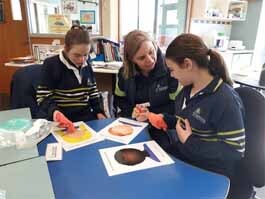


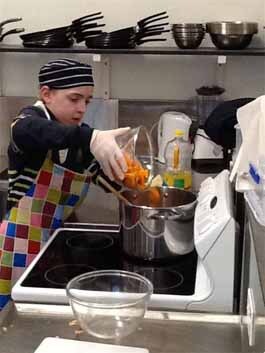
In keeping with the Australian Government’s Melbourne Declaration (2008), St Aloysius aims to be an inclusive school that attends to individual learning needs so that all students flourish and achieve to their full potential. The College supports students with learning difficulties according to a student’s individual needs. Students requiring significant learning support will usually have an Individual Education Plan (IEP) that is developed by parents, teachers and teacher assistants and other allied education or medical professionals and sets out the learning program and strategies for that student. The Kingston campus also has other programs for students such as reading intervention. At a classroom level, teachers aim to differentiate their programs for students to meet individual student need. For more information in relation to learning support:
Kingston Campus: gabrielle.fisher@catholic.tas.edu.au
Huntingfield Campus: nickie.birchall@catholic.tas.edu.au




Enrichment - Gifted and Talented Students


At St Aloysius Catholic College we aim to give all learners the opportunity to become confident, just and productive human beings. Learners are ‘unique individuals who bring their own strengths, talents and needs to the learning process’. We believe that learning is most powerful when the individual needs of the learner are considered and therefore, education for gifted and talented students provides aims for these learners to achieve their personal best.
“The Catholic School is committed to educate the whole person founded on the conviction that human beings have a transcendent destiny and that education of the whole person must form the spiritual, intellectual, physical, psychological, social, moral aesthetic and religious capacities of each child.” The Archbishop’s Charter for Catholic Schools, 2016
Giftedness is the possession of natural abilities or aptitudes at levels significantly beyond what might be expected for one’s age in the following domains: Intellectual, creative, social and physical (DEST 2013: ACARA 2017)
While giftedness equates with high ability, talent equates with high achievement. Talent is defined as achievement or performance at a level significantly beyond what might be expected from same-age-peers in one or more fields of human activity. The difference is that giftedness is the potential to achieve and talent is the realisation of that potential. Often talent emerges from giftedness or ability as a consequence of the student’s learning experience. (Gagné 2003)
Quality Gifted and Talented provisions are evident in:
- The development of quality differentiated learning programs
- Development and implementation of student learning plans
- Development and implementation of highly adjusted educational programs
- The establishment of a flexible and responsive learning environment
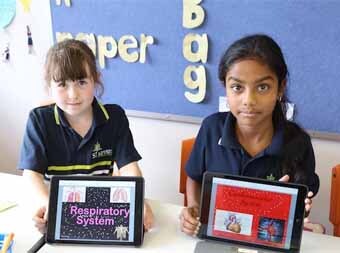

Identification
In most cases classroom teachers in consultation with parents refer highly capable students for further assessment. Students can be identified as Gifted through an Educational Assessment conducted by a registered psychologist. The College’s Enrichment Teachers or Special Learning Needs teachers use the KBit 2 screening assessment tool to assess referred students. Students are classified as gifted if they are assessed in the top 10 percentile for their age.
What does Gifted and Talented Education look like at St Aloysius?
Tier 1 Response
Classroom Teachers:
- facilitate a classroom culture that has high expectations for all students and strives for excellence and celebrates success.
- make adjustments to the learning environment and curriculum to meet the needs of gifted students.
- apply a variety of pedagogical approaches that support and promote student learning.
- develop and implement learning plans for individuals as required.
- actively engage in professional learning to be able to identify and meet the needs of gifted and talented students.
Tier 2 Response


Identified students may be included in extension programs to supplement classroom learning.
Grade Prep to Four:
Students identified as gifted are included in the General Enrichment Program and students identified as talented in Mathematics become members of the Maths Enrichment Program. Currently students involved in either program participate with like-minded students in regular Enrichment Days conducted by the Enrichment Teacher.
Grade Five to Ten:
Identified students in Grades Five to Ten are offered subjects aimed at extending their knowledge and skills.
- Project Based Learning (Grade Five to Eight)
- Extension Maths (Grades Five to Ten),
- Extension English and Science (Grades Nine and Ten).
Many subject areas also encourage students to enter academic competitions and external programs that provide students with challenging learning opportunities.
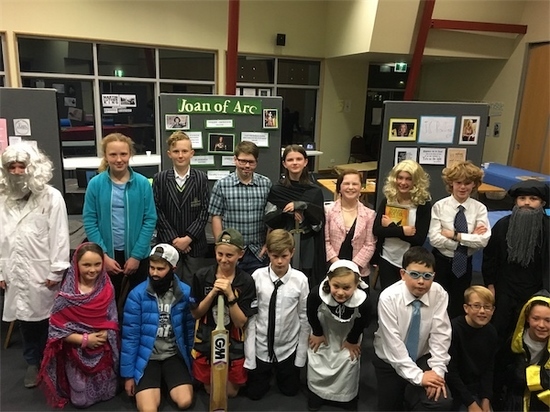
Tier 3 Response
In some cases some students will demonstrate ability that far exceeds that of their age peers. When the adjustments listed in Tier 1 and Tier 2 do not adequately meet a student’s needs, academic acceleration may be considered. These students are usually in the top one or two percent of students on standard educational assessments such as the WISC or Weschler Intelligence Scale.
Acceleration: assigning a student to a higher grade level than is typical given the student’s age for the purpose of providing access to appropriate challenging learning opportunities. Acceleration can be considered for individual subjects or a student’s entire academic program.
The student, parents, teachers and where appropriate, educational psychologists should be consulted when investigating a student’s eligibility for acceleration. In particular the student’s social and emotional needs must be considered as they move to an older age group.
For more information in relation to Gifted and Talented students, contact susan.mcgann@catholic.tas.edu.au
ASSESSMENT AND REPORTING

Assessment and reporting at St Aloysius is based on the Australian Curriculum standards for each subject area. All subjects have a set of understanding, skill or performance standards which teachers use to assess students learning. It is important to note that a standards based learning approach compares students’ performance to standards, rather than comparing them to other students. In standards based assessment, students are graded on how well they have demonstrated the standard. Grades are based on the depth and breadth of their knowledge, skills and understanding relative to the expected achievement standard.
Teacher primarily use ongoing formative assessment within their classrooms for the purposes of monitoring learning and providing feedback. Teachers use assessment data to inform what they should teach next, or what aspects of their lessons need to be reviewed and taught again.
When assessing student’s work, St Aloysius has made an informed decision to provide feedback to students on how they can develop and improve, rather than focus on grades. Most current studies on grades suggest that marks or grades do not progress learning, whereas descriptive feedback on strengths and areas requiring development assist students in the next phase of learning.
Parents can monitor their child’s progress during the year as feedback and work samples are posted on the College online learning management systems, Seesaw at Kingston and Fides at Huntingfield.
Reporting
The College issues summative reports for all students Prep to Grade Ten in Term Two and Four. In Australian schools it is mandated that an A-E grading scale is used on Grade Three-Ten reports. Teachers meet to discuss and moderate student work prior to reports being issued to ensure that assessment standards are consistent throughout the College.
Kinder students do not receive a formal report but have a learning portfolio that they complete during the year that demonstrates their development.
Students in Grades Seven to Ten also receive a progress report at the end of Term One. This report is a brief summary of each student’s progress at this stage of the year. As secondary students have multiple teachers, it is difficult for parents to meet every teacher at parent-teacher conferences; therefore the progress report provides some extra feedback for parents in the early stages of the year.
PARENT-TEACHER CONFERENCES
St Aloysius holds parent-teacher conferences in Term One and at the start of Term Three once midyear reports are issued.
The first conferences in Term One are goal-setting consultations where students, parents and teachers meet to discuss student’s areas for development. Goals and strategies to assist students to improve are then established.
The College requires all parents of primary students (Prep to Grade Six, to attend an interview with their child’s class teacher), whilst it is optional, but encouraged for parents with students in Grade Seven-Ten particularly for Core subjects, or at times a teacher may request an interview with a parent. Upper primary and secondary students are encouraged to attend interviews with their parents so that they have input into their goals for the year.
Term Three Parent-Teacher conferences are used to expand on midyear reports and to develop goals and discuss areas for improvement during the second half of the year.
HOMEWORK
The College homework policy states that:
- Students are expected to allocate sufficient time at home to complete unfinished class work, to complete research for projects and to practise their literacy and numeracy skills.
- Reading daily is considered to be one of the most important homework elements for all students.
- Homework will not be set for weekends or over holiday periods.
- Instructions for homework tasks can be typed into the students’ devices. Students are expected to demonstrate pride in their homework by completing the work to a high standard and returning it within the given time frame.
- Students are encouraged to seek assistance from teachers and parents/guardians when difficulties arise, including the amount of time spent on homework. Homework setting takes into account the students’ home responsibilities, family arrangements and extra-curricular activities.
|
Grade One |
Homework will consist of a weekly Home Reading Program and Magic Word Program, as well as a few additional projects throughout the year that relate to curriculum topics. |
|
Grade Two |
The children are asked to read for at least 10 minutes four times per week. Spelling homework to begin in Term Two, children are asked to learn their spelling words at home to reinforce what is happening during the school day. This year we will provide your child with the occasional homework task that will be family orientated and we ask you to work together to complete it. |
|
Grade Three |
Homework should take no longer than 20 minutes each evening. The main purpose of homework is to develop independent working skills and foster links between the classroom and home environment. It is expected that children will read for 10 minutes four times a week and students are asked to learn their spelling words at home to reinforce what is happening during the school day. |
|
Grade Four |
The recommended time to be spent on homework each night is 20 minutes. This is a maximum time and if children are still working on a task it may indicate that they have not fully grasped the concept in class and need some further assistance. In this time frame it is expected that your child complete a minimum of 10 minutes of individual or parent assisted reading. Students are asked to learn their spelling words at home to reinforce what is happening during the school day. |
|
Grade Five |
Homework duration should be approximately 30 minutes and be in line with the College homework policy as per the Grade Information Booklet. |
|
Grade Six |
Homework duration should be approximately 30 minutes and be in line with the College homework policy as per the Grade Information Booklet. |
|
Grade Seven |
Homework is an integral part of Middle School. Students will be regularly engaged in tasks outside of school hours. Most occasions will not require more than an average of 45 minutes weeknights. Extended tasks are sometimes set and may require time on the weekend. |
|
Grade Nine |
Homework is a compulsory part of Senior School. All students should be completing at least 1.5 hours of homework five days a week. If students have extended tasks such as projects they should consider spending some time on these during weekends so that they are not leaving them until the last minute to complete. |
STUDENT LEADERS
Kingston Campus

Positive and secure relationships are vital in providing strong learning foundations for now and in the future. Grade Four students are the leaders at the Kingston campus and each student has a position of responsibility at the Campus. They care for the younger children and provide excellent role models. These experiences provide enrichment, encouragement and enhancement to student learning. The staff are passionate about the education of students in this unique developmental stage and are committed to developing a partnership between home, school and the community. At the end of Grade Three, students are provided with the available roles and responsibilities, at which time they are to apply for their preferred role. These leadership roles include:
- Student Representative Council (SRC)
- Busy Bee
- Environment
- Sport
- Information, Communications and Technology (ICT)
- Faith and Mission
Huntingfield Campus
Grade Ten students fulfil the student leadership roles at Huntingfield, whilst the younger grades are given the opportunity to join various groups to work with the student leaders.
College Prefects for 2020
College Captains – Harrison
Henry and Nicola Brcic
Team of College Prefects – Jorja Bryson, Sumali
Buamee, Ella Burton, Chloe Christie, Lola De Kramer, Mia Dolzan, Nina
Handicott, Kody Jankiewicz, Joe Ramage, Benita Rudahindwa, Abbie Vince,
Kirra Watkins and Darcy Willis
2020 House Leaders
Aloysius Leaders – Joshua Brazendale and Ashlea Turner
Aikenhead Leaders – Jessica Denton and Josephine
Thompson
Charity Leaders – Amalia Cifford and Ellie
Henley
Fides Leaders – Olivia Perry and Harry Smith
2020 Grade 6 House Leaders
Aloysius Leaders – Kate Broadribb and Eli Jones
Aikenhead Leaders – Molly Duffy and Amber
Bumford
Charity Leaders – Dominika Matuszak and Jacob
Burton
Fides Leaders – Livinia Button and Archie
Watt
UNIFORM
The Uniform Shop is located at the Huntingfield Campus and is open at the following times for assistance and purchases:
|
Tuesday |
8.15am – 10.00am |
|
Wednesday |
2.00pm – 3.30pm |
|
Thursday |
1.30pm – 3.30pm |
- There are additional times and days when the uniform shop is open at the commencement of the school year. These are advertised to the school community.
- Purchases can be made at other times by submitting a Uniform Shop Order Form or alternatively via the Qkr! app (see below for Qkr! Information)
Kingston Campus
|
Summer Uniform |
Winter Uniform |
Sports Uniform |
|
|
Early Years Uniform |
See Sports Uniform |
See Sports Uniform |
Early Years 1/4 Zip Top |
|
Girls |
Navy Skirt |
Navy Skirt |
Polo Top |
|
Boys |
Grey Shorts |
Grey Trousers |
Polo Top |
.jpg)
.jpg)
.jpg)
.jpg)
Kingston Campus Formal uniform options
.jpg)
.jpg)
Kingston Campus Sports uniform options
* PLEASE NOTE: Photos are examples only, not all uniform options are shown, please refer to the Uniform shop for the full range.
Huntingfield Campus
|
Summer Uniform |
Winter Uniform |
Sports Uniform |
|
|
Girls |
School Blazer |
School Blazer |
Polo Top |
|
Boys |
School Blazer |
School Blazer |
Polo Top |
.jpg)
.jpg)
.jpg)
.jpg)
Huntingfield campus Formal uniform options
.jpg)
.jpg)
.jpg)
.jpg)
Huntingfield campus Sports uniform options
* PLEASE NOTE: Photos are examples only, not all uniform options are shown, please refer to the Uniform shop for the full range.
- School bucket style sun hats are to be worn by ALL students at the Kingston Campus in Term One and Term Four. Students at Huntingfield Campus are encouraged to wear either the hat or College cap or to play in the shade.
- College Blazers at Huntingfield are to be worn when wearing formal uniform both to and from school, after school in public areas, school excursions (when formal uniform is required) and to mass.
- Spray Jackets can be worn under blazers
- Socks are not to display logos or brands.
- Any hair ribbons should be in the College colours, Navy, Lime Green or White.
- One pair of small gold or silver studs may be worn in the lower lobe of each ear. No other body or facial piercings are permitted. Students may wear a clear plastic stud in other piercings if required.
- Visible Make-up is not permitted.
GRADE TEN TRANSITION

Transition to post Grade Ten education is a major focus for all students in our Grade Nine and Ten Learning Centre.
All Grade Nine and Ten students have weekly Work Studies lessons. Work Studies is an Australian Curriculum subject that focuses on preparing students for post Grade Ten study and careers. As part of this subject Grade Ten students complete a week of work experience that enables students to explore potential career pathways.
Work Studies and Pastoral Programs in Grade 10 specifically focus on study skills required for pre-tertiary or vocational pathways, as the majority of our students go on to Grade Eleven studies. Grade Ten students sit formal end of year exams in all core subjects so that they have an exam week experience before encountering the challenging examination process in Grades Eleven and Twelve.
St Aloysius works closely with Guilford Young College (GYC) in the transition process to Year Eleven. Students visit GYC for career and subject exhibitions and GYC counsellors meet individually with students to assist with subject selections. GYC also hold open nights during the year for students and parents. All students who enrol at GYC attend an orientation day at the Hobart GYC Campus in Term Four.
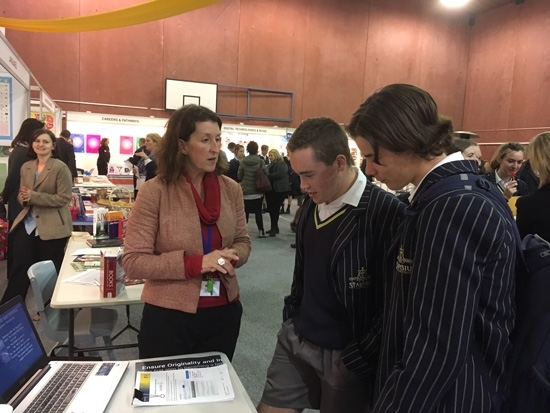
Grade Nine and Ten teachers are also available throughout the year to provide advice for students and parents on study pathways and suitable subject selections for Years 11 and 12. Teachers are also available to assist students to seek alternative pathways post Grade 10.
INDIGENOUS PROGRAM

The Indigenous program aims to help support and connect Aboriginal students with their history and culture. This is partly done through a camp on Bruny Island. With the help of cultural leaders, the students are given a safe space to explore current events, aspects of their culture and history. The Indigenous program also aims to support students in their studies through Personal Learning Plans that are created in conjunction with students, parents and teachers. These plans can help students learn a new skill, develop their social skills or achieve academic goals.
We have created a cultural garden at the Kingston Campus. This garden is in the heart of the College and is a place to come together as a class, a grade or a group of teachers and parents.
For more information in relation to our Indigenous Program, please contact either the Kingston or Huntingfield campus.

TRANSPORT AND CAR PARKING
Buses
Bus services to and from the College are private contractors provided by arrangement with the Department of State Growth.
Bus tickets are purchased from drivers. Multiple tickets are available upon request.
Students who use more than one bus service on their journey to and from school each day, may be eligible for a transfer pass. Should you need further assistance please contact the Department of State Growth on 6166 3333 or 1300 135 513.
Parking at Kingston Campus

Options for parking include:
- The Parish car park
- The ‘top’ car park, located off Donohoe Gardens (via Jindabyne Rd)
- Roslyn Avenue, please use the school crossing
- Jindabyne Road
- Carita Road
- Kunama Drive
- Aldinga Street
Refer to the map for these car parking suggestions.
We have a staff member on duty in the morning and afternoon in the Parish car park. The staff member will be present to ensure that the car park is used safely and to welcome students each day.
Drop and Go Zone
To ensure that this section runs smoothly we ask all families who access this space to be aware of our procedures listed below. These are put in place to enable it to be safe and user-friendly for everyone.
- Students to alight from the car on the left-hand side only onto the footpath.
- Parents are not to get out of the car. Students who use the Drop & Go zone must be capable of getting in and out of the car by themselves, including putting on their seat belt. If they are not able to do so parents will need to park in a designated car park space and assist them as they currently do.
- School bags are not to be retrieved from the boot. These need to be in the car with the student so that students do not have to go behind or in between cars
- Teardrop flags will clearly mark the allocated Drop & Go zone. Students are not to enter or leave cars which are waiting in line to use the zone - please be patient and wait until you are safely parked in the zone.
- Please ensure you have your handbrake on once you have pulled into and stopped.
- Staff supervision will be present at the start and end of each day.
Please do not use:
- The Parish car park as a ‘drop-off zone’
- The bus area along Roslyn Avenue
- The driveway in front of the office at Kingston (Roslyn Avenue) is not to be used as a thoroughfare by parents for dropping off, picking up or parking. We are very aware of the need to keep the children in our care safe and for this reason the area is designated for staff parking and a student crossing. There is a bollard blocking off access to this area.
Designated disabled car parks are located next to the office at the Kingston campus. These can be accessed via the main driveway, however if the bollard is in use, please use the alternate driveway off Roslyn Ave closest to the road crossing. These spaces are only for use by those families displaying a Disabled Parking permit collecting students with a disability.
Parking at Huntingfield Campus

Options for parking include:
- The main car park. Upon pick up in the afternoon your child will need to wait in the designated area at the top of the stairs until they see you park your car, at which point they will be permitted to walk to the car. A teacher is on duty in this area.
- Nautilus Grove (on the side of the road in front of the College).
- Guardian Court (at the end of the cul de sac)
- Huntingfield Avenue
Please do not use:
- The lane directly in front of the car park, this is a designated bus lane
- The lawn area located on the left of the entrance driveway
Disabled car parks are located next to the office at the Huntingfield campus in the main carpark. Due to the limited number of disabled car parks available, where possible, these are only for families collecting students with a disability. If you have a disability but the children you pick up are able, please use one of the alternative parking options and have them walk to you.
* Please note the boom gate accessing the gym car park is locked at 4pm daily.
OUTSIDE SCHOOL HOURS CARE
Blackmans Bay Childcare Service, Adventure Patch, provide before and after school care for the Kingston campus. School holiday care is also offered. Refer to their website for further details by clicking on the link below:
http://bbchildcare.org/locations/st-aloysius-outside-school-hours-care/
HEALTH AND SAFETY
Allergy Aware

The College is an allergy aware school and as such have a ‘No Nut’ policy for both campuses. We always aim to work with families and welcome open discussion on how we can best ensure the student stays safe at school. An up to date action plan is required to be provided to the College, along with any relevant medication. The decision about where to keep medication is made with consultation between the parent and College. A copy of the action plan is then located in the College staff room and provided to the class / homeroom teacher.
Sun Care

It is a requirement at Kingston Campus that sun hats be worn outside during Term One and Term Four. Students at the Huntingfield Campus are encouraged to wear a hat. Should a student not have a hat, they will be directed to areas of shade during recess and lunch, or occasionally there is a small supply of loan hats at the school office that a student can use. Hats can be purchased from the Uniform Shop or the College office outside of Uniform shop opening times.
- Buckets Hats (Kingston and Huntingfield Campus) $16.00
- Caps (only permitted at Huntingfield Campus) $16.00
TECHNOLOGY AT THE COLLEGE
Apple Ipads and Laptops are used in the College from Kinder through to Grade Four. These are provided by the College. They are shared throughout each year level, with Grade Threes and Fours making the most use of laptops in readiness for Grade Five. From Grade Five students are required to Bring Their Own Laptop (see BYOL information below).
BYOL 2020
St Aloysius Huntingfield Campus has a Bring Your Own Laptop (BYOL) strategy. This document provides information regarding appropriate purchases.
Bring Your Own Laptop
The College supports both Windows and Mac laptops. A common misconception among parents in the past has been that students require a Mac laptop however this is not the case. Chromebooks and tablets (including iPads) are not supported, as the operating systems are quite limited.
Specifications for purchasing a laptop
|
Minimum |
Recommended |
|
Intel Pentium or faster CPU (Intel Celerons not recommended) or AMD equivalent |
i3, m3 or faster CPU or AMD equivalent |
|
4GB of RAM |
8GB of RAM |
|
64GB Storage |
120GB or higher Solid State Drive (SSD) |
We recommend laptops have a screen between 11 and 14 inches. These are more manageable for students to carry around all day than larger laptops, however this is not a requirement. DVD drives are rarely used and add to the size and weight of a laptop, thus they are not recommended.
Laptops should have at least 4GB of RAM. RAM, also known as memory, is where your computer stores information it needs when it is running. The more RAM you have the more programs you can run simultaneously. If possible 8GB of RAM is great for ‘future proofing’ your machine. More information on RAM can be found here.
The CPU, also called the processor, is the brains of your computer. Intel is the main manufacture of mobile CPUs with the other being AMD. Celerons and Pentiums are Intel’s budget range of processors. Celerons are best avoided as they can be a little slow. Pentiums will be sufficient however you might find you get a longer life out of you device by getting something a bit more powerful. You can find more information on processor models here. Sites such as this are useful to compare performance between CPU models.
Laptops should have a minimum of 64GB of storage. This is where the operating system and all your files and folders are stored. There are a few different types of storage in laptops these days and you can read more about them here. Solid State Drives (SSDs) are the fastest form of storage. We strongly recommend a laptop with a 120GB or higher SSD rather than a traditional hard drive as they make a big difference in performance. Laptops with 64GB or 120GB of storage might sometimes be advertised as SSDs but can be a slower type of memory called eMMC, we recommend double checking the full specifications of the machine to check that it is a proper SSD.
Laptops should be brought to school fully charged ensuring a battery life of at least 5-6 hours so they last the school day. In accordance with our Work Health Safety Policy students are not to bring a 240v power supply connection to the College unless it has been tested and tagged by a qualified technician and the tag is displayed and current.
There will be an opportunity for students to bring in their charger to be tested and tagged by the College in Term 1. For more information please click here.
Choosing a Laptop
If you find the choice of laptops overwhelming a good way to narrow them down is to start by looking at laptops with 120GB or higher SSD. Many Window laptops still come with slower hard drives so limiting your search to laptops with a decent SSD narrows the choice considerably.
At the time of writing Officeworks, JB-HiFi, Harvey Norman and Dell online all had laptops with a Pentium Processor, 4GB of RAM and a 120GB SSD in the $500-$700 range. This would be a good starting point for a sound machine and from here you could consider faster processors or more RAM depending on your budget and requirements. Cheaper machines in line with the minimum specifications above will be sufficient but you do get what you pay for and you can’t expect the same life out of them as you will get by spending a little extra.
If you need any advice on laptops you can email sacc.ictadmin@catholic.tas.edu.au and we will do what we can to help.
No accessories are required however if you choose to purchase a mouse it should be wireless and over ear headphones are preferable to earbuds.
Software
In most cases no additional software will need to be purchased.
We recommend students have Chrome and Firefox web browsers installed on their laptops in addition to Safari or Internet Explorer/Edge Browser that comes pre-installed on Mac and Windows laptops. These are both free downloads.
The College’s Learning Management System, Fides, is accessed via a web browser as is the Google Suite of apps which students have access to through their College Gmail account.
Both Mac and Window laptops should have up to date anti-virus installed. Windows 10 includes Windows defender which can be used and other options available on both Windows and Mac are Avast and AVG (both of these have free versions that are as effective as the paid versions, it is not necessary to spend large amounts of money for anti-virus software).
Laptops should be kept up to date with the latest Windows or MacOS updates as these often include important security updates.
Note: A limited number of College loan laptops are available on application for families in financial hardship. Applications can be made by obtaining the required documentation from the College.
Mobile Phone Policy
"Technology does have a role to play in the classroom, but this needs to be facilitated. Personal mobile phones, on the other hand, are proving to be a distraction for students in terms of their access to social media sites, as well as potentially being a source of bullying activities.” (School TV)
- Students at the Huntingfield Campus will no longer be able to access their phones during school time (8.30am-3.10pm), including break times.
- Phones, if students choose to bring them, must remain in school bags at all times.
- Any messages from parents or guardians that students need during the day are required to go through the College Office.
- Students will be issued a reminder after their first infringement in this new approach.
- Should a second infringement occur, phones would be stored in the HC Office for students to collect at the end of the school day. The Pastoral Coordinator will notify parents/guardians.
- After a third infringement, parents or guardians will be required to collect the phone from the HC Office. The Pastoral Coordinator will notify parents/guardians.
- After this third infringement, the student concerned will be managed and supported by the Pastoral Care team and may be requested to hand their phone into the HC Office at the start of the day.
- Phones are not required as part of any learning tasks.
- For off Campus excursions or activities, there may be some instances where mobile phones are permitted in the interests of student safety.
- Exemption for medical purposes may be given, after direct negotiation between the parent/guardian and a Co-Principal or Deputy Principal.
“The challenge is to help young people find a balance and learn to manage their school work, have a social life and get the good parts out of technology. Mobile phones are changing our young people's behaviour in ways that could not have been predicted.” (School TV)
Please read and watch the challenges in regards to mobile phone use in schools:
https://staloysius.tas.schooltv.me/wellbeing_news/special-report-smartphones-schools
CHAPEL AND MASSES
Kingston
At the Kingston Campus we have very close links with our Parish Church, The Church of Christ the Priest. We celebrate Mass together on Wednesday mornings every two or three weeks during term time. Individual classes prepare the Mass based around themes and feasts of the season. Students participate by doing readings, carrying the offertory and writing and reading Prayers of Intercession as well as running the powerpoint. We also use the church for special liturgies such as Ash Wednesday, Palm Sunday and Nativities.

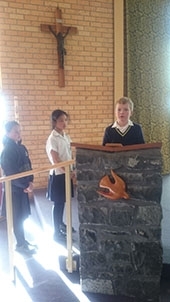

Huntingfield
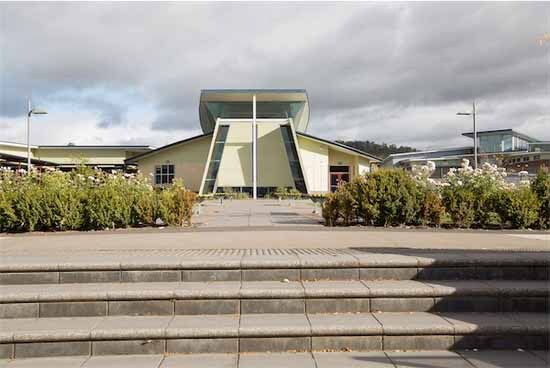
The location of the Chapel at the Huntingfield Campus is geographically central in relationship to the learning centres, gym and administrative building. The grassed area in front of the Chapel has a cross set out in the pavement design. The Chapel was the first building completed at the Huntingfield Campus. As a Catholic College the focus is on our Catholicity and the charism of our founders, the Sisters of Charity. The Chapel is central to our worship and weekly Masses.
The Parish Mass on Thursday is conducted at the Chapel. There is a roster of classes who attend the Mass usually in learning centre groups. One specific class is responsible for the organisation of the Mass. Students under the direction of the Religious Education (RE) teacher and Liturgy coordinator select readings and organise music. Students participate in readings, offertory and preparation of prayers of intercession. Occasionally some of our student school leaders provide a reflection of the Gospel reading. Father Chris allows the students to have a strong involvement in the Mass. We also have a number of regular Parish members attend weekly Masses.
Inside the Chapel we have stained glasses windows with appropriate links to Scripture passages and the Good News of the Gospel. In the foyer we have photos of the past principals and our current co-principals, which reminds us of our link to the Sisters of Charity, our founders; “Impelled by the love of God”.


LIBRARY
Kingston Campus


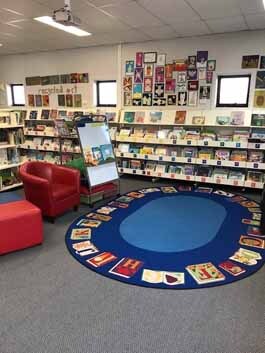

The library at the Kingston campus is a place of quiet learning and enjoyment where students are encouraged to choose ‘good fit’ books to complement their class literacy work. There is a wide range of fiction and non-fiction books available for loan, as well as magazines such as National Geographic Kids, Wacky…but True, HistoriCool and Double Helix.
Classes from Kinder to Grade Two have a library lesson each week while Grades Three and Four have a dedicated time each fortnight to swap and borrow books.
All students must have a library bag to safely carry their books to and from home.
The library is open during some lunchtimes. During this time students have access to a variety of board games, drawing/writing, reading and research activities.
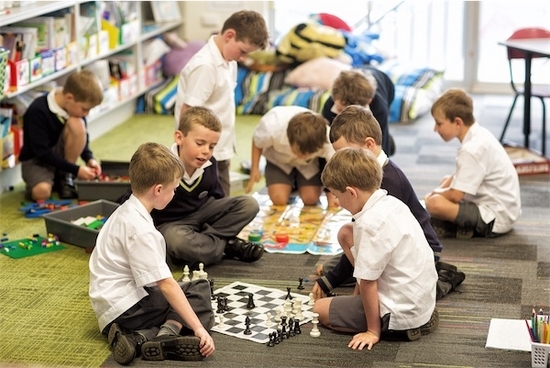
|
Number of books that may be borrowed |
|
|
Kinder |
1 |
|
Prep |
1 |
|
Grade One |
1 |
|
Grade Two |
2 to take home and up to 5 for their book boxes in the classroom |
|
Grade Three |
2 to take home and up to 8 for their book boxes in the classroom |
|
Grade Four |
2 to take home and up to 8 for their book boxes in the classroom |
Huntingfield Campus


The Huntingfield library is open from 8.30am until 3.10pm from Monday to Friday. The library is available for use by students and staff of the college. Students have access to fiction, non-fiction, picture books, graphic novels, biographies, magazines and a reference collection. There is a “Young Adult” section in the library for students in Grade Eight and above. Younger students may access this collection if approved by a parent/guardian in writing.
Library loans are for a period of two weeks but this can be extended and items can be renewed. There is a maximum borrowing of 10 books per student.
The library is open at lunchtime from Tuesday to Friday. During this time students have access to private study, reading or alternatively there is a wide variety of board games or cards for use.
The Huntingfield library also maintains the Parent Resource Library. Parents and members of the community are welcome to borrow from this library.


BOOK CLUB
Scholastic Book Club operates at the Kingston Campus and Grade Five and Six at the Huntingfield campus. Teachers compile the orders for their classes. The orders are then given to a staff member who is responsible for the completion and checking of the total school order. Alternatively, parents may also place an order directly with Scholastic, via their website or by downloading the LOOP App. Books purchased this way still earn 20% back in Scholastic Rewards for the College. The LOOP website is available via the link:
https://mybookclubs.scholastic.com.au/
FRENCH
Starting in Grade Three through to Grade Six, students learn both spoken and written French. After this time, French becomes an elective subject. Some students also have the opportunity to compete in French competitions and recitals throughout the year.
MUSIC
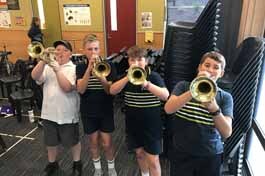

All students at both campuses engage in weekly music lessons. At the Kingston campus, all students in Grade Two participate in the Grade Two Choir. Students can then choose to participate in a school choir in Grades Three and Four. Whilst at the Huntingfield campus, students in Grades Five and Six are able to learn an instrument in their weekly Music lesson and from Grade Seven onwards, Music is an elective subject.
Private tuition is also available at both campuses for a variety of instruments. Many of these lessons take place during school hours. Fees apply to these lessons and enquiries are made through the school via Instrumental Tuition application forms.
Kingston Campus
|
Greg Stanton |
Piano, Saxophone |
|
|
Sean Brady |
Drums |
|
|
Anita Cairns |
Singing |
|
|
Lucy Brown |
Flute, Keyboard |
|
|
Ben Brinkoff |
Guitar, Ukulele |
Huntingfield Campus
|
Sean Brady |
Drums |
|
|
Ben Brinkhoff |
Bass Guitar & Ukelele |
|
|
Anita Cairns |
Singing |
|
|
Lucy Brown |
Flute, Keyboard |
|
|
Joel Roberts |
Guitar |
|
|
Greg Stanton |
Piano & Woodwind (Flute, Clarinet, Saxophone) |
CANTEEN
Kingston Campus
The canteen is available for students on Wednesdays and Fridays.
Lunchtime orders are placed via the Qkr! App. using the online menu.
Huntingfield Campus
The Café at Huntingfield is open for recess and lunch everyday Monday – Friday. Orders to be placed via the Qkr app using the online menu. Eftpos facilities are available
HEALTH AND PHYSICAL EDUCATION
The school provides students weekly Health and Physical Education (HPE) lessons and in addition, students undertake a variety of extra programs.
Prep – Grade Six
Learn to Swim
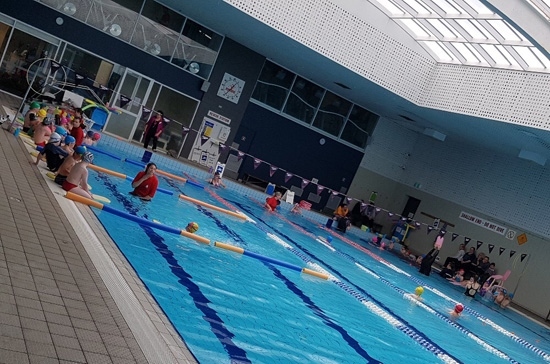
|
Prep – Grade Two |
Term Four (two weeks) |
Friends Health & Fitness |
|
Grades Three – Six |
Term Three (two weeks) |
Clarence Aquatic Centre |
Gymnastics
|
Prep – Grade Two |
Term Three (eight weeks) |
Kingborough Gymnastics Centre |
|
Grades Three – Six |
Term Two |
Kingborough Gymnastics Centre |
Other Sporting Opportunities
|
Grades Three & Four |
Term Two |
Kingborough Sports Centre for Indoor Cricket, Gymnastics and Basketball. |
|
Grades Five and Six |
Term |
Catholic Primary Schools Football & Netball rosters, Friday afternoons in school time |
Students participate in 3 different Sporting carnivals throughout the year.
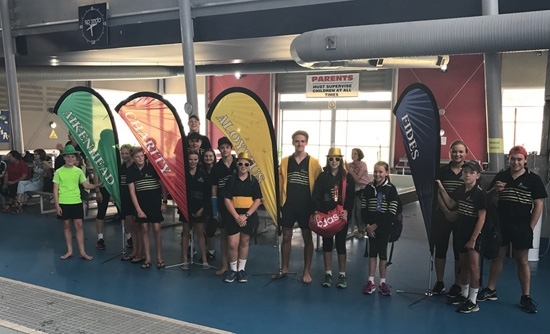
|
Grades Three-Six |
Swimming Term 1 |
Cross Country Term 2 |
Athletics Term 4 |
|
St Aloysius Catholic College |
All students |
All students |
All students |
|
Huon & Channel |
Selected Students |
Selected Students |
Selected Students |
|
All Catholic Schools |
Selected Students |
Selected Students |
Selected Students |
|
All Schools |
- |
Selected Students |
- |
Students in Prep – Grade 2 participate in an Athletics carnival in Term 4.

Huntingfield Campus (Grades Seven to Ten)
Grades Seven & Eight
|
Physical Education |
Four week aquatics program Four week gymnastics program Fitness testing Range of team and individual sports Mountain Bike Riding Athletics and Cross Country Training |
|
Health |
Positive Mental Health Smoking and Alcohol Awareness Sexuality Education Healthy Lifestyles/Nutrition |
Grade Nine
|
Physical Education |
Fitness testing Range of team and individual sports Mountain Bike Riding Athletics and Cross Country Training Table Tennis/Squash Fitness Leadership Unit Aquatic Sports (Water Polo/Basketball) |
|
Health |
Positive Mental Health Key Areas of Fitness Sexuality Education Risk Taking |
Grade Ten
|
Physical Education |
Aussie Sports Leaders SEP (Sport Education Program) TRUST Fitness Recreation (Lawn Bowls, Archery, Roller World) Fitness testing Range of team and individual sports Athletics and Cross Country Training |
|
Health |
Positive Mental Health Addiction Driver Awareness Sexuality Education |
Students participate in 3 different Sporting carnivals throughout the year.
|
Grades Seven-Ten |
Swimming Term 1 |
Cross Country Term 2 |
Athletics Term 3 |
|
St Aloysius Catholic College |
All students |
All students |
All students |
|
Southern SATIS |
Selected Students |
Selected Students |
Selected Students |
|
State SATIS |
Selected Students |
- |
Selected Students |
|
All Schools |
- |
Selected Students |
- |

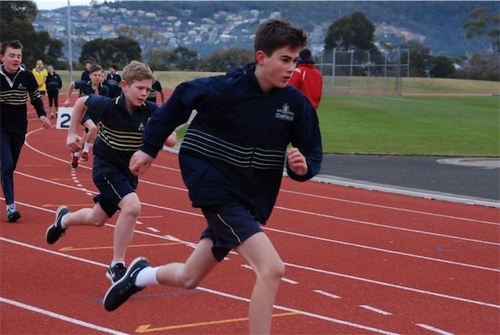
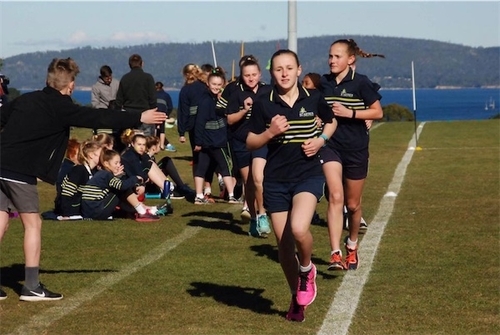


SATIS
Sport Association of Tasmanian Independent School (SATIS)
St Aloysius Catholic College is a member of SATIS and this gives us many amazing opportunities for our secondary students (Grades Seven-Ten).
1. SATIS Carnival opportunities include:
- Southern SATIS swimming carnival
- State SATIS swimming carnival
- Southern SATIS cross-country carnival
- Southern SATIS athletic carnival
- State SATIS athletic carnival
Students are selected for the SATIS carnivals from their results in the school carnival.

2. SATIS After School Sport Rosters
Playing in school sport rosters allow students to develop a sense of belonging, experiment with new sports and to develop skills in a fun environment with minimal pressure. The sport rosters are played at the participating schools, therefore we do have ‘away’ games and the location could be as far away as St Virgils or MacKillop. As a College we understand that with working parents it is hard to get the students to the venues by 4.15pm, so we have committed to transporting the teams. It is important to note that parents are responsible for collecting their child at the end of the game.
Parent help with coaching, managing and umpiring is always appreciated.
Expressions of interest for these rosters are sent via Fides and then all interested students will be sent home a permission letter, which secures their place in a team. It is vital students and parents are checking the sport pages on Fides.
The cost of the sport rosters is included in the SATIS registration fee we receive at the beginning of the year and the College has decided not to pass this on to the parents, so participation in ALL SATIS sport rosters are FREE.
|
Available SATIS Sports |
|
|
Girls |
Netball |
|
Girls & Boys |
Basketball, AFL, Cricket, Tennis and Soccer |

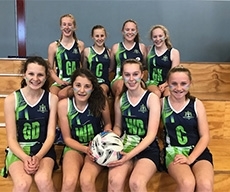
Other Sport Opportunities:
Secondary students are also given the opportunity to participate in the following non-SATIS sport rosters: Badminton, Horse riding, Triathlon, Volleyball (indoor and Beach) and Hockey. There is a registration fee for these sports.
St Aloysius Soccer Club

The St Aloysius Catholic College Soccer Club (SASC) administers soccer teams for our students from ages under 6 to under 12 (Prep to Grade Six) in the local CRJFA competition. A dedicated team of parents runs the club, and our much loved and enthusiastic volunteers coach our teams. Our club ethos is to support our College students to be active with their friends through the practice and play of soccer. We are very much an inclusive club and it is all about participation and having fun rather than winning. We have a number of both girls and boys playing, including all girls’ teams.
Joining is easy: Notices go out early in Term One seeking players and registrations are taken early in Term One each year via the online registration portal. The season kicks off around late April early May (depending on Easter) and games are played on Saturdays right through until September.
http://www.myfootballclub.com.au/
Our season concludes with a celebration barbeque and trophy afternoon that has become a much-loved event on the calendar. Soccer is a wonderful way to keep our children active on those winter mornings. We have our own Facebook group to assist with communication or the school can put you in touch with a member of our friendly committee if you have any questions.


Duke of Edinburgh award

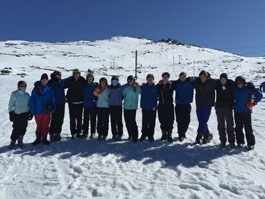
St Aloysius leads the way in Tasmania with the Duke of Edinburgh Award. The internationally recognised award is the leading structured youth development program for young Australians between the ages of 14-25, helping them to explore their potential regardless of age or circumstances.
Students have the opportunity to participate in surfing, rock climbing, bushwalking, canyoning, bike riding and snow camps. There are three levels to the program, Bronze, Silver and Gold. St Aloysius offers both Bronze and Silver, whilst students can select to do Gold at GYC from 2018.
There are four main components to the Duke of Edinburgh award; physical recreation, skill, service and adventurous journey. The balance of the four components, combined with the rigour of an external program means that the student outcomes are very strong.

What impact does the Duke of Edinburgh Award have on a young person?
Through this challenging journey of self-discovery, our participants:
- Are equipped and empowered to achieve their personal best
- Learn to take responsibility for their goals and choices
- Become connected to and actively engaged within their immediate community
- Make a real difference to society through their positive contributions and involvement
- Learn to persevere and overcome barriers to success
- Learn important life skills; and
- Increase their career opportunities.
http://www.dukeofed.com.au/about-the-award/the-award/
AFFILIATED ASSOCIATIONS

Community Group
The St Aloysius Community Group (SACG) was formed in 2016 following a decision by parents to change from a more formal Parents & Friends structure to a more relaxed, community-based group. While there is a main co-ordinator, all parents are warmly invited to be a part of the group and participate and assist in any way they can. The group’s main aims are community-building and fundraising for school projects. Some of the events they organise and are involved in include:
|
Term 1 |
Welcome morning teas Easter raffle |
|
Term 2 |
Mothers Day Mass morning tea Mothers Day Stall Entertainment books Sausage sizzles / pizza day |
|
Term 3 |
Mid year function ie. Quiz nights Fathers Day Breakfast Fathers Day stall |
|
Term 4 |
Assistance at the school fair Pizza day at Huntingfield Disco for Kingston campus students |
Some recent examples of items funded by the Community Group includes funding to help establish the Birth to Four ‘Explorers’ program and the tennis court upgrade at the Kingston Campus.
The Community Group are keen to have as many people involved as possible and are always open to new ideas and suggestions to build and support our community.
For information on upcoming events refer to the College newsletter or email community.group@staloysius.tas.edu.au
College & Parish Fair
The St Aloysius Catholic College and Parish Fair is conducted every year in November and has a long and proud tradition in the Kingborough community. With our large College community of students, staff and over 300 associated Parishioners, our Fair has become a very popular community event, attracting over 5000 people last year.
The Fair is our major fundraiser for the year and all profits raised directly benefit the students and the Parish. Each year a committee is formed during second term to make the preparations to run the fair. The committee is made up of a co-ordinator, treasurer, secretary and other parents and parishioners. Kindergarten parents and other new families to the College are encouraged to be active supporters and volunteers in the lead up and on the day.
Many students, alumni and young people from the parish also serve as volunteers on the day and during preparations. It's a fantastic way to meet other parents and families and to be involved with the College and parish community
As you can imagine, we are also always looking for donations of goods and or services, large and small from the business community connected with the College and parish. All businesses that support the Fair have the opportunity for their business logo to be placed in Fair news, which is distributed to College families and parishioners. Business logos are also displayed on Fair Day. We are also able to promote businesses via our Fair Facebook Page, which has proven very successful and effective.
Apart from the obvious fundraising aspect of the College and Parish Fair, it is a fantastic opportunity for building a strong and vibrant community. Through working together towards a common good, the Fair is another of the many ways that we can forge strong links between our College and Parish, as seen in the many and varied people who volunteer to help make the day a resounding success each year.
Parish Links
Our College and Parish community are strongly linked. All families who become a part of our College community automatically become members of our parish family. Our links continue to grow and develop in a number of different ways, including:
- our College and Parish Fair, where students, staff, parents and parishioners all work together to put on a fabulous day which not only celebrates our unique community, but also raises much needed funds which are shared between the College and Parish.
- our Parish volunteer program, where members of the parish community generously give up their time to assist in classrooms with reading, craft and other subjects, drive the College bus for excursions, help out in the library and at the Birth to Four Program, and generally respond to requests to the school for assistance.
- our Sacramental Program: this is family-centred, parish-based and school-supported. Members of the Parish Sacramental Team, which includes parents, parishioners and teachers, run weekend sessions for children and their families to prepare the children for the Sacraments of Reconciliation (usually end of Grade Three) and Confirmation and First Eucharist (usually Grade Four).


- our College/Parish Masses, where families and staff are warmly invited to attend a weekend Parish Mass and students participate in various ways including reading, singing and bringing up the offertory.
- our Weekday Parish Masses: students on both campuses regularly attend either the Wednesday morning 9am Parish Mass at Kingston or the Thursday morning 9.40am Parish Mass in the Huntingfield Chapel. Parents are most welcome to attend these Masses.
- the sharing of information: the weekly Parish bulletin is uploaded to our College website, and copies of our College newsletter are available for parishioners in the Church. Any relevant items are promoted in both newsletters so everyone is informed about what is happening both in the College and Parish community.
- our Grade Four students for the last few years have assisted the parish secretary by folding the parish bulletins each week. Not only does this greatly save time for the secretary, it also builds connections for our students with our parish.
- our Parish Youth Group – students in Grades Seven-Ten are warmly invited to join our parish youth group where we run different events and activities such as movie nights, day outings and youth Masses. The group also runs fundraising activities to support members to attend events such as the Australian Catholic Youth Festival.
One of the primary roles of the Pastoral Associate is to continue to find new ways of strengthening the links between our College and Parish community.
Birth to Four ‘Explorers’
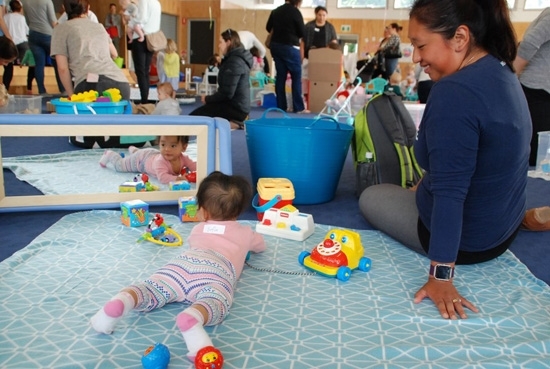


Explorers aims to provide an inviting and engaging Birth to 5yr old early learning program, with play-based learning experiences that support parents in engaging with their child’s learning and development, and a place for families to connect with other families from our local community.
Children under full-time school age, along with their parents, grandparents, carers, or other adult family members from the school and wider community, are very welcome to join us at Explorers. We do encourage regular attendance for families to get the best benefit from the program.
Explorers sessions run during term times. Up to date information on the program can be found on the College website.
THURSDAY ‘PRE-KINDER’ EXPLORERS
We offer a ‘pre kinder’session which is available for children who are in the year before they will be attending Kindergarten (at any school). This session will see the teacher focusing specifically on this age group and their needs in readiness for school. Their siblings are very welcome and there will be activities to suit all age ranges, with a Teacher Assistant as additional support.
Thursday Pre-Kinder sessions: 9:00am - 10:30am
REGULAR SESSIONS – FRIDAY EXPLORERS
We will continue to run our regular session times as listed below.
Session 1: 9am – 10.30am
Session 2: 11am – 12.30pm
EXCURSIONS
We will be scheduling in some excursions throughout the year. Please check the College website, sign up to be on our email list or request to join our SACC Explorers Early Years Learning Program closed Facebook group, to keep up to date on our calendar of events.
We ask families to bring a piece of fruit to share, water for their child to drink and any snacks you child may require during the session. Please do not bring any nuts. To enrol or for further information please contact andrea.reece@catholic.tas.edu.au.

Old Scholars
We have a current list of all of our former students so we can contact them via email with upcoming events. If you have a child who graduated from the College and would like to keep up to date with the news from the College click on the link to register your details
https://sacckingston.schoolzineplus.com/alumni
COLLEGE CONTRIBUTIONS
The College in conjunction with the College Board has established the ST ALOYSIUS CATHOLIC COLLEGE BUILDING FUND so that members of our College community, Parish community and the overall public can actively contribute towards the continued growth and success of the College.
The building fund is a fully endorsed deductible gift recipient fund which means that any contribution made to the fund is tax deductible to the donor.
All monies gifted to the building fund are solely for use by the College for the continued development and upgrade of College facilities and buildings and towards targeted projects to benefit the students. If you would like to contribute to the building fund please feel free to contact staff at the College office and they will be able to assist you.
VOLUNTEERING AND WWVP
Volunteers are very welcome in our College and very much appreciated. Some examples of where you may be able to volunteer some time include:
- Parent help in the classroom or on an excursion
- Helping at the Uniform Shop
- St Aloysius Community Group (SACG) events, e.g. Sausage Sizzle, Mothers’/Fathers’ Day Stall
- Members of the College Board
- Parish volunteers in the classroom
- Coaching a SACC sporting team after school
- Helping out at our College and Parish Fair
If you wish to volunteer in our College, you must have a current WWVP (Working With Vulnerable People) Registration.
The application process is to be completed online at the link below:
http://www.justice.tas.gov.ua/workingwithchildren
The volunteer fee is currently $19.44 as set by the Department of Justice. This is to be paid at any Service Tasmania Shop. You will need to show 100 points of ID and have your photo taken.
When you have your WWVP Registration card, please take it to either College Office and a copy will be made for the College’s records and placed on file.
TERMS, CONDITIONS AND FEES
Responsibility for payment of fees
College Office staff can assist with any queries you may have in regard to payment of fees and levies.
Current fees and levies are outlined in the Schedule of Fees and Charges.
A single invoice will be issued in Term One of each year for the full year fees and levies covering all students for which the parent/guardian is responsible. Full payment is due 30 days from the date of the invoice, unless other arrangements are made using a payment arrangement form. Please note that any payment arrangement entered into is purely administrative.
The College will accept a payment arrangement of 10 equal monthly installments (February to November) with payments to be received by the 15th of each month. A final payment settling the account in full is required by the end of Term Four. You will be asked at the end of each year how you would like to pay fees for the next year.
Notwithstanding the amount invoiced, in the event of default on payment arrangements, the total amount outstanding will become immediately due. The school reserves its right to take steps to recover payment in full.
The schedule of fees and charges may be updated each year and includes information about payment options. This also states any applicable interest rate payable on overdue fees or levies. Interest is payable from the due date until payment is received in full.
An obligation or liability on the part of two or more persons binds them jointly and each of them severally.
Parent(s)/guardian(s) agree to honour the financial commitments required by the school in accordance with the Schedule of Fees and Charges and the terms and conditions.
Each person who signs the enrolment form accepts legal responsibility for payment of school fees and levies incurred for the entire period of the enrolment of the student.
Where there is more than one person signing the Enrolment Form:
- the School may issue only one account in the name of all individuals listed on the Enrolment Form;
- each person is independently and jointly responsible for payment of the whole of the Fees, meaning the School can (at its discretion) seek to recover the whole of the Fees from any one parent/guardian or any combination of them;
- notice to any one parent/guardian is taken to be notice to all parents/guardians; and
- each individual consents to their information in relation to a Fees account (including payments made or overdue) being disclosed to each other individual on a Fees account.
A capital levy that applies to each family is determined by the Tasmanian Catholic Education Office and contributes towards assisting with the financing costs of all systemic schools/colleges
What your College fees provide for your child(ren)
Tuition fees are formulated and designed to be a singular education cost and as inclusive as possible. This deliberate approach is aimed to minimise the extent to which additional payments from families are required throughout the year. Any additional charges that may be applied would be for activities such as, but not restricted to, interstate or overseas excursions, specific fundraising for charities, student celebration or graduation dinner as well as some of our specific options subjects i.e. VET - Hospitality and Duke of Edinburgh.
Accordingly as an example your fees cover such expenses as:
- Class excursions (except as stated above).
- Long day excursions for Grade Three and Grade level camps and retreats for Grades Four-Ten students (excluding Grade Six trip to Canberra).
- Information technology resources such as networked software and specialised school/parent interactive applications such as School Stream, Seesaw and Fides.
- Sport and gym equipment including facilities maintenance and management.
- Musical instruments (leased and owned).
- Specialist subject materials and equipment for Art, Design in Wood, Home Economics and Science. Some elective subjects do have additional fees.
- Participation in SATIS after school sport rosters and carnivals.
Pro-rated school fees
In cases where a Student commences at or leaves the School part-way through the year, Fees will be pro-rated in accordance with this part.
Tuition fees
Subject to minimum notice requirements for withdrawing a Student in accordance with clause 9, Fees will be pro-rated to the nearest school week, including any partial school weeks of attendance as full school weeks.
For example, in a school year with 40 school weeks, if a Student commences on Thursday of the 12th week, the amount of Fees owing will be pro-rated to 29 school weeks. In this example the amount payable would be 72.5% of the full year tuition fee (because 29 ÷ 40 = 0.725).
Capital levy
The amount of the capital levy payable is pro-rated to the nearest week, including any partial weeks of attendance as full weeks, similar to the way tuition fees are pro-rated. When it comes to the capital levy each week (or part week) where any student in the family attends is counted as a week for the purposes of pro-rating the levy.
Tuition levies/program fees
Fees for certain programs may be listed in an invoice for Fees as ”levies”, to cover costs for additional items the Student may require during the school year or extra curricular activities such as excursions. The full amount of levies is payable for all Students. In exceptional circumstances where a Student will not or did not participate in the activity and the School has not already incurred a cost a full or partial credit may be provided.
We may require You to pay Fees for some large activities (e.g. interstate trips) prior to that activity taking place.
Notice of withdrawal
Written notice of at least ten school weeks is required prior to withdrawal of a Student from the School. Where notice is not provided, full tuition Fees may need to be paid to the School for the number of school weeks where notice was not provided. This includes withdrawal prior to the start of the school year. For example, if a Student is withdrawn at the start of the school year, a total of 10 weeks of Fees may need to be paid.
The notice period may be reduced or waived in special circumstances. The School office needs to be contacted in the first instance if You would like to discuss this possibility. However, the final decision regarding the reduction or waiving of this fee will be at the Principal’s discretion.
Special payment arrangements
If You are experiencing financial hardship or are having difficulty paying on time, the School office can be contacted to discuss Your circumstances. Variations in payment arrangements can be approved where required, and in exceptional circumstances limited fee remissions can be provided.
You may be required to provide evidence of need to enter into a special payment arrangement or receive a fee remission.
Failure to pay
Where payment is not made to the School on time, debt recovery action may be commenced against any one or all of the parent(s)/guardian(s) who signed the Enrolment Form.
If You fail to make payment of any Fees owing to Us within thirty days of the due date for payment, We will be entitled (without prejudice to any other right or remedy We may have) to do one or more of the following:
- suspend the Student’s enrolment at Our sole discretion until payment is made;
- terminate the Student’s enrolment in accordance with Termination;
- charge interest on overdue amounts at the Supreme Court of Tasmania then prescribed rate for post- judgement interest per annum from the due date to the date payment is received in full;
- use Our own internal collection procedures to collect overdue Fees or Optional Charges; and/or
- appoint a Collection Agency and/or solicitor to collect overdue Fees and Optional Charges.
The School or the Archdiocese of Hobart may charge You for, and You indemnify the School and the Archdiocese from, all reasonable costs and expenses (including without limitation all legal and/or collection costs and expenses on an indemnity basis) incurred by the School or the Archdiocese resulting from the default (failure to pay) or in taking action to enforce compliance with these Terms of Enrolment.
Tasmanian Catholic Education Commission (TCEC) Policy on Fees Assistance
The College has fully implemented the TCEC School Fees Assistance Policy, which provides an optional fee discount for families with three or more children in any Tasmanian Catholic school. Please contact the College office for full details.
If you have any queries regarding fees, please contact the Business Manager, Mr Les Gardner.
Qkr!

The Qkr (pronounced ‘quicker’) app is available for use in transacting with St Aloysius Catholic College.
What is Qkr for?
You will be able to pay for various activities and events (Formal Dinner, Year Books, Drama night etc) on Qkr without the need to send money through to the College office. Online purchases from the Uniform Shop can be made using the Qkr app.
How do I download Qkr ?
Qkr by MasterCard can be downloaded for free from Apple’s app store for iPhones (for iPads download the iPhone app) or from Google Play for Android phones and tablets. After downloading the app and registering, simply select St Aloysius Catholic College from ‘Nearby Locations’ on Qkr or type Aloysius after tapping the magnifying glass in the top right of the home screen on Qkr. All you need to do is register your children by name, grade and class.
FEEDBACK
Any feedback you have about the College Handbook, we would greatly appreciate. Please email your feedback to sacc.principals@catholic.tas.edu.au or alternatively speak with either College office.







